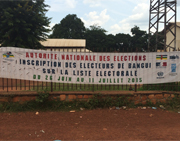
Editor's note: this piece originally appeared in African Arguments and was written by Enough Project Field Researcher Kasper Agger and Christopher Day, Assistant Professor of Political Science at the College of Charleston and Non-Resident Senior Fellow with the Enough Project.
The Central African Republic (CAR) is at a critical juncture. The country is preparing for elections this October. But it is also facing a severe humanitarian crisis and is struggling to end a brutal civil war that has claimed more than 6,000 lives and displaced at least 1 million people. That’s nearly one quarter of the population.
However, few in the country believe that the timing for the elections to replace its transitional government, which has been led by President Catherine Samba-Panza since January 2014, is right. Many warn that the premature timetable could even drive CAR back into widespread violence.
Armed groups across the country face little resistance and continue to terrorise civilians. The peace process, especially its crucial disarmament component, is moving at a snail’s pace. Yet international diplomats led by France and the International Contact Group on the CAR demand elections now.
There is still time make a course correction and postpone the elections, but this window is closing quickly.
The external push towards elections has left local leaders, armed groups, and ordinary Central Africans behind. Grassroots consultations around the country culminated in May’s Bangui Forum, which provided an important avenue for citizen participation and was widely recognised as a success. But there has been no meaningful follow up and it is likely the Bangui Forum’s 400 pages of recommendations will be stranded on the shelf of good intentions – not because it was a bad strategy, but because it will never be put into practice…
Read the full piece on African Arguments.
Photo credit: Christopher Day

